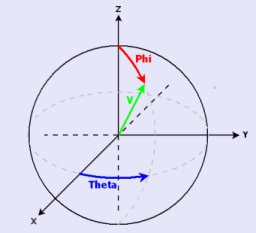DilationDisk3d
Performs a three-dimensional dilation using a structuring element matching with an oriented disk.
Access to parameter description
For an introduction:

Figure 1. Azimuthal and polar angles on the unit sphere
See also
Access to parameter description
For an introduction:
- section Mathematical Morphology
- section Introduction To Dilation

Figure 1. Azimuthal and polar angles on the unit sphere
See also
Function Syntax
This function returns the outputImage output parameter.
// Function prototype.
std::shared_ptr< iolink::ImageView >
dilationDisk3d( std::shared_ptr< iolink::ImageView > inputImage,
double thetaAngle,
double phiAngle,
uint32_t kernelRadius,
std::shared_ptr< iolink::ImageView > outputImage = NULL );
This function returns the outputImage output parameter.
// Function prototype.
dilation_disk_3d( input_image,
theta_angle = 0,
phi_angle = 0,
kernel_radius = 3,
output_image = None )
This function returns the outputImage output parameter.
// Function prototype.
public static IOLink.ImageView
DilationDisk3d( IOLink.ImageView inputImage,
double thetaAngle = 0,
double phiAngle = 0,
UInt32 kernelRadius = 3,
IOLink.ImageView outputImage = null );
Class Syntax
Parameters
| Class Name | DilationDisk3d |
|---|
| Parameter Name | Description | Type | Supported Values | Default Value | |
|---|---|---|---|---|---|
 |
inputImage |
The input image. The image type can be integer or float. | Image | Binary, Label, Grayscale or Multispectral | nullptr |
 |
thetaAngle |
The azimuthal angle in degrees. | Float64 | Any value | 0 |
 |
phiAngle |
The polar angle in degrees. | Float64 | Any value | 0 |
 |
kernelRadius |
The length of the disk radius in voxels. | UInt32 | >=1 | 3 |
 |
outputImage |
The output image. Its dimensions and type are forced to the same values as the input image. | Image | nullptr | |
Object Examples
auto foam = readVipImage( std::string( IMAGEDEVDATA_IMAGES_FOLDER ) + "foam.vip" ); DilationDisk3d dilationDisk3dAlgo; dilationDisk3dAlgo.setInputImage( foam ); dilationDisk3dAlgo.setThetaAngle( 0 ); dilationDisk3dAlgo.setPhiAngle( 0 ); dilationDisk3dAlgo.setKernelRadius( 3 ); dilationDisk3dAlgo.execute(); std::cout << "outputImage:" << dilationDisk3dAlgo.outputImage()->toString();
foam = imagedev.read_vip_image(imagedev_data.get_image_path("foam.vip"))
dilation_disk_3d_algo = imagedev.DilationDisk3d()
dilation_disk_3d_algo.input_image = foam
dilation_disk_3d_algo.theta_angle = 0
dilation_disk_3d_algo.phi_angle = 0
dilation_disk_3d_algo.kernel_radius = 3
dilation_disk_3d_algo.execute()
print( "output_image:", str( dilation_disk_3d_algo.output_image ) );
ImageView foam = Data.ReadVipImage( @"Data/images/foam.vip" );
DilationDisk3d dilationDisk3dAlgo = new DilationDisk3d
{
inputImage = foam,
thetaAngle = 0,
phiAngle = 0,
kernelRadius = 3
};
dilationDisk3dAlgo.Execute();
Console.WriteLine( "outputImage:" + dilationDisk3dAlgo.outputImage.ToString() );
Function Examples
auto foam = readVipImage( std::string( IMAGEDEVDATA_IMAGES_FOLDER ) + "foam.vip" ); auto result = dilationDisk3d( foam, 0, 0, 3 ); std::cout << "outputImage:" << result->toString();
foam = imagedev.read_vip_image(imagedev_data.get_image_path("foam.vip"))
result = imagedev.dilation_disk_3d( foam, 0, 0, 3 )
print( "output_image:", str( result ) );
ImageView foam = Data.ReadVipImage( @"Data/images/foam.vip" ); IOLink.ImageView result = Processing.DilationDisk3d( foam, 0, 0, 3 ); Console.WriteLine( "outputImage:" + result.ToString() );